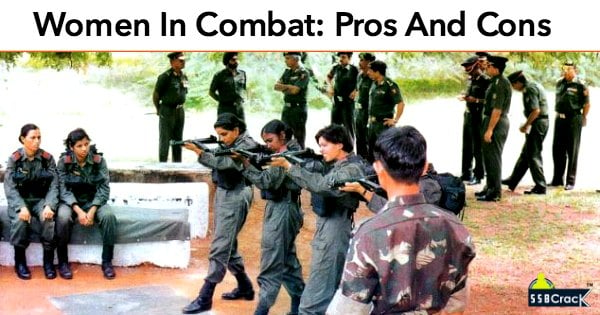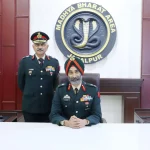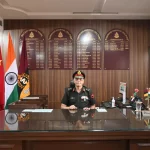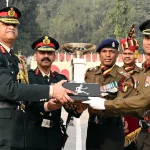While addressing both houses of the parliament on the day of the budget session, the President, Mr. Pranab Mukherjee (who is also supreme commander of the Indian Armed Forces) said that the government in future would recruit women for combat roles across the military. This news has signalled a radical move in the gender parity in one of the most male dominated profession. Across the world, countries like the United States of America, Israel, Germany and New Zealand have allowed its women soldiers to take on combat roles. The debate of whether women should be inducted and allowed to be a part of the fighting force of a country’s military has been on-going for what seems to be forever. India, which is one of the largest armies in the world, too resisted this change with concerns of the vulnerability of women and their physical strength. But now, India is to join hands with a handful of other countries who allow female applicants to opt for combat roles.
Now that this change will occur in the future, let’s turn our attention to what are the pros and cons of women in combat roles.
PROS:
- Ability doesn’t seek approval of gender.
When we talk about the qualities and characteristics that need to be present in a soldier, we don’t mention the gender. How does it matter if the applicant is a man or a woman as long as he/she possesses the necessary qualities. Ability doesn’t seek approval of gender. It’s scientifically proven that women are more mentally tough than men and hence are better able to deal to stress. As far as the physical strength is concerned, women can be very well trained. Another aspect which people miss nowadays is that we live in the 21st century where battles aren’t always fought with swords and guns. There exists technology and if a woman is technologically competent, they are as good as male officers. - What men do, women do better.
It is important to understand that even though the military is always seen as a profession for the men, it doesn’t make men superior. What is important is skill and mind you skills can be learned. So if a woman wants to showcase her abilities, talents and skills in the combat roles, in spite of being aware of the mental and physical strain and stress it would cause her, what is the harm in letting her realizing her dreams? - Influx of applicants leading to a bigger and better pool of candidates.
Who says patriotism is just meant for men? Remember Rani Lakshmi Bai, Begum Hazrat Mahal, Kamala Nehru. These women along with many others played a vital role in fighting for freedom of our country. When a country limits a job position to just men, women are deprived of those jobs, thus adversely affecting the pool for recruitment. In a military where there is no compulsion to join, if a woman is willing to join the combat roles shouldn’t she be welcomed? If she has made this decision it’s safe to say that she is aware of the risks involved. - Examples of lady officers at present in the Army.
Let’s take a look at how the lady officers are doing at present in the Indian Army. For starters, Lt Col. Mitali Madhumita, was awarded the Sena Medal and thus becoming the only lady army officer to get a Gallantry Award for her act of valour in Kabul in 2011. Being the only Lady amongst thousands of men, Capt. Aswathy Ganpath was heading jawans who were much older than her in Ladkah, a high altitude field posting which isn’t an easy tenure. Lt. General (Mrs.) Punita Arora of the Army Medical Core is the first Woman Lt. General of the Indian Army. She also saw a tough tenure in Fategarh in 1968, as at that time dacoits were all over the place. Cmdr Gutta Sowjanya Sree and Lt Vartika Joshi from the Navy and Asst Cmdt Vasundhara Chouksey from the Coast Guard have braved the rough seas between Chennai and Kochi as part of an expedition aboard the INSV Mhadei under the leadership of Commander Dilip Donde. All of the examples that are quoted above have only been possible because these ladies were given a chance. The women are doing great in the field of the Army in which they are inducted. Imagine what all they are capable of and can do if all the roles would be available to them.
CONS:
- Physical incapability of combat.
Women are physically incapable of combat. This is a common reason that is put forth for denying combat roles to women. The physical strength and fitness for combat roles is something that women cannot develop. The trainings are designed in a way that only suits the men. Thus, women cannot cope up and fit the combat roles. Further, it might lead to injuries to women. It is also unwise to give special treatment to women as rules in the military are applicable to everyone without discrimination. - Ethical problems.
There have been cases where women in the military have reported cases of sexual abuse by their colleagues. Though the Army does take strict and severe action against such offenders but things could get worse if they are captured and subjected to cruelties by the enemies. Some women may be able to endure this torture while some may not. The prisoners of war (POWs) often go through unbearable amount of physical abuse but when it comes to women, sexual abuse is more likely to occur. - The mind-set.
The tradition and belief of combat roles only made for men is another hindrance. Especially in a country like India where men have problems and issues accepting orders from women, such a change might not be accepted and therefore, resent the idea of women in combat roles. - Family life suffers.
Growing up without a father has implications for the child but things get worse when the mother isn’t around too. Becoming pregnant, not being able to maintain a balance between their family and their work might be serious problems for women in combat roles. Going back in service after giving birth might affect their performance and some women might develop Post Traumatic Stress Disorder (PTSD) which is quite severe in women than in men.
To crack the AFSB and SSB interview, we recommend you to get “Let’s Crack SSB Interview” book from Amazon.
Download eBooks:
Conclusion: It is said that with change comes chaos, and then comes stability. Imagine the time when the Army must have allowed the induction of women in the areas in which they work today. There might have been questions raised then, chaos might have occurred. It needs to be understood that no change occurs overnight. It requires time and it requires a change in attitude of the society. Change is important for progress but the flipside of the change can’t be ignored too. I guess we’ll just have to wait and watch where this will go.













